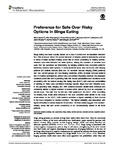Preference for Safe Over Risky Options in Binge Eating
| dc.contributor.author | Neveu, R | |
| dc.contributor.author | Fouragnan, Elsa | |
| dc.contributor.author | Barsumian, F | |
| dc.contributor.author | Carrier, E | |
| dc.contributor.author | Lai, M | |
| dc.contributor.author | Nicolas, A | |
| dc.contributor.author | Neveu, D | |
| dc.contributor.author | Coricelli, G | |
| dc.date.accessioned | 2019-02-21T10:52:15Z | |
| dc.date.available | 2019-02-21T10:52:15Z | |
| dc.date.issued | 2016 | |
| dc.identifier.issn | 1662-5153 | |
| dc.identifier.issn | 1662-5153 | |
| dc.identifier.uri | http://hdl.handle.net/10026.1/13329 | |
| dc.description.abstract |
Binge eating has been usually viewed as a loss of control and an impulsive behavior. But, little is known about the actual behavior of binging patients (prevalently women) in terms of basic decision-making under risk or under uncertainty. In healthy women, stressful cues bias behavior for safer options, raising the question of whether food cues that are perceived as threatening by binging patients may modulate patients' behaviors towards safer options. A cross-sectional study was conducted with binging patients (20 bulimia nervosa (BN) and 23 anorexia nervosa binging (ANB) patients) and two control groups (22 non-binging restrictive (ANR) anorexia nervosa patients and 20 healthy participants), without any concomitant impulsive disorder. We assessed decisions under risk with a gambling task with known probabilities and decisions under uncertainty with the balloon analog risk taking task (BART) with unknown probabilities of winning, in three cued-conditions including neutral, binge food and stressful cues. In the gambling task, binging and ANR patients adopted similar safer attitudes and coherently elicited a higher aversion to losses when primed by food as compared to neutral cues. This held true for BN and ANR patients in the BART. After controlling for anxiety level, these safer attitudes in the food condition were similar to the ones under stress. In the BART, ANB patients exhibited a higher variability in their choices in the food compared to neutral condition. This higher variability was associated with higher difficulties to discard irrelevant information. All these results suggest that decision-making under risk and under uncertainty is not fundamentally altered in all these patients. | |
| dc.format.extent | 65- | |
| dc.format.medium | Electronic-eCollection | |
| dc.language | eng | |
| dc.language.iso | eng | |
| dc.publisher | Frontiers Media SA | |
| dc.rights | Attribution-NonCommercial 4.0 International | |
| dc.rights | Attribution-NonCommercial 4.0 International | |
| dc.rights | Attribution-NonCommercial 4.0 International | |
| dc.rights | Attribution-NonCommercial 4.0 International | |
| dc.rights | Attribution-NonCommercial 4.0 International | |
| dc.rights | Attribution-NonCommercial 4.0 International | |
| dc.rights | Attribution-NonCommercial 4.0 International | |
| dc.rights | Attribution-NonCommercial 4.0 International | |
| dc.rights.uri | http://creativecommons.org/licenses/by-nc/4.0/ | |
| dc.rights.uri | http://creativecommons.org/licenses/by-nc/4.0/ | |
| dc.rights.uri | http://creativecommons.org/licenses/by-nc/4.0/ | |
| dc.rights.uri | http://creativecommons.org/licenses/by-nc/4.0/ | |
| dc.rights.uri | http://creativecommons.org/licenses/by-nc/4.0/ | |
| dc.rights.uri | http://creativecommons.org/licenses/by-nc/4.0/ | |
| dc.rights.uri | http://creativecommons.org/licenses/by-nc/4.0/ | |
| dc.rights.uri | http://creativecommons.org/licenses/by-nc/4.0/ | |
| dc.subject | anorexia nervosa | |
| dc.subject | binge eating | |
| dc.subject | bulimia nervosa | |
| dc.subject | cognitive control | |
| dc.subject | decision-making | |
| dc.subject | loss aversion | |
| dc.subject | risk | |
| dc.subject | uncertainty | |
| dc.title | Preference for Safe Over Risky Options in Binge Eating | |
| dc.type | journal-article | |
| dc.type | Journal Article | |
| plymouth.author-url | https://www.ncbi.nlm.nih.gov/pubmed/27065829 | |
| plymouth.issue | MAR | |
| plymouth.volume | 10 | |
| plymouth.publication-status | Published online | |
| plymouth.journal | Frontiers in Behavioral Neuroscience | |
| dc.identifier.doi | 10.3389/fnbeh.2016.00065 | |
| plymouth.organisational-group | /Plymouth | |
| plymouth.organisational-group | /Plymouth/Faculty of Health | |
| plymouth.organisational-group | /Plymouth/Faculty of Health/School of Psychology | |
| plymouth.organisational-group | /Plymouth/REF 2021 Researchers by UoA | |
| plymouth.organisational-group | /Plymouth/REF 2021 Researchers by UoA/UoA04 Psychology, Psychiatry and Neuroscience | |
| plymouth.organisational-group | /Plymouth/Users by role | |
| plymouth.organisational-group | /Plymouth/Users by role/Academics | |
| plymouth.organisational-group | /Plymouth/Users by role/Researchers in ResearchFish submission | |
| dc.publisher.place | Switzerland | |
| dcterms.dateAccepted | 2016-03-23 | |
| dc.identifier.eissn | 1662-5153 | |
| dc.rights.embargoperiod | Not known | |
| rioxxterms.versionofrecord | 10.3389/fnbeh.2016.00065 | |
| rioxxterms.licenseref.uri | http://creativecommons.org/licenses/by-nc/4.0/ | |
| rioxxterms.licenseref.startdate | 2016 | |
| rioxxterms.type | Journal Article/Review |



